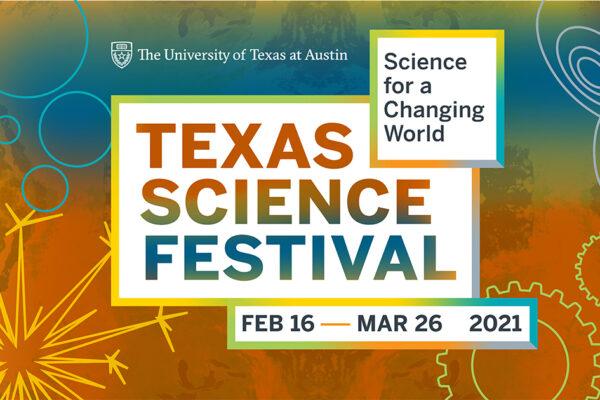WHAT: The University of Texas at Austin welcomes science enthusiasts everywhere to the Texas Science Festival, a virtual celebration featuring rapid-fire and deep-dive presentations by world-changing scientists, live hands-on demonstrations of explosive experiments, telescope viewings and opportunities to interact with experts from Texas’ flagship public research institution.
WHEN: The event kicks off Tuesday, Feb. 16 and concludes Friday, March 26.
WHERE: Live events are streamed via online platforms such as Zoom webinar, YouTube and Facebook. Register to receive access details, and find the schedule at: www.sciencefest.utexas.edu
WHO: The event is free and open to the public. Notable presenters include:
- Nobel laureates and Breakthrough Prize winners Jim Allison, the UT Austin alumnus and cancer-research pioneer, and Steven Weinberg, the beloved physicist;
- Texas researchers working on the front lines of pandemic science such as Lauren Ancel Meyers, director of the University of Texas COVID-19 Modeling Consortium, and Jason McLellan, whose technology is integral to four of the five leading coronavirus vaccines;
- “Kate the Chemist” Biberdorf, whose explosive demos have been featured on the “Today” show and “The Late Show with Stephen Colbert”; and
- dozens of other STEM experts from the UT Austin student, faculty and friend community.
BACKGROUND: The inaugural Texas Science Festival encompasses and builds upon several popular existing events featuring University of Texas STEM faculty members and students, including Explore UT and Girl Day at UT Austin, all of which are being held virtually this year. The six-week event also includes new public talks, “Science Sparks” events where pairs of experts each provide rapid-fire presentations on a theme, skywatching tours from the McDonald Observatory, the Visualizing Science Showcase with science-themed art and more. The virtual event is hosted by UT Austin’s College of Natural Sciences.
MEDIA CONTACT: Christine Sinatra: 512-471-4641 Christine.sinatra@austin.utexas.edu.
A sampling of highlights:
Defeating COVID-19
Tuesday, Feb. 16, noon-12:45 p.m. CT
Hear from Jason McClellan, whose innovation features in nearly every leading coronavirus vaccine, about how years of prior work enabled lightning-fast vaccine development; and from Lauren Ancel Meyers, director of the UT COVID-19 Modeling Consortium, who has consulted with top national, state and local leaders, about the latest forecasts on the spread and impact of this virus.
Moon Tour Live from the McDonald Observatory
Thursday, Feb. 18, 7-8 p.m. CT
Watch live views of the moon from a world-class telescope in West Texas highlighting lunar surface features, Apollo landing sites, moon phases and more. Moderators will be available to answer your questions. (Other observatory events include solar viewing on March 5, a deep sky tour on March 6 and a Hobby-Eberly Telescope tour on March 25.
The Fooled Brain: A UT Brainstorms Event
Thursday, Feb. 25, 7 p.m.
Hear from University of Texas neuroscientists and get your questions answered about the brain’s susceptibility to misinformation, in a conversation on how people can be easily misled when processing information and making decisions.
Big Strides in Fighting Cancer
Tuesday, March 9, noon-12:45 p.m. CT
Texas is home to one of the nation’s most ambitious efforts to fight cancer, yielding breakthroughs in cancer research that are already saving countless lives. Hear from Nobel laureate and UT alum Jim Allison, who led the immunotherapy revolution; and MacArthur fellow and faculty member Livia Eberlin, who invented the MasSpec Pen, a game changer for the detection and removal of cancer during surgery.
Solving the Universe’s Big Questions
Tuesday, March 16, noon-12:45 p.m. CT
The ordinary atoms that make up the known universe — from us and the air we breathe to the planets and stars — make up only 5% of all matter and energy in the cosmos. The remaining 95% is made up of dark matter and dark energy. Learn from National Academy of Sciences member Katie Freese and astrophysicist Karl Gebhardt about what they are learning from the cutting edge of discovery about these mysterious, nonluminous ingredients of our cosmic cocktail.
Visualizing Science Showcase
Monday, March 22 through Friday, March 26
Each year, the College of Natural Sciences invites its faculty, staff and students to submit the most stunning and inspiring images from their scholarly research for its Visualizing Science competition. Explore this year’s winners and learn more about the science behind the art.




